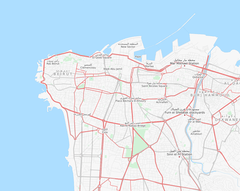Crowne Plaza Beirut Hotel
The Crowne Plaza Beirut Hotel is a five-star Crowne Plaza hotel in Beirut, Lebanon. Inaugurated on 22 September 2001,[1] it is the first Crowne Plaza to open in Lebanon.[2] The modern tower makes a notable mark on the landscape, overlooking Hamra Street in the downtown Hamra district.[3] Fady Sawaya, a hotelier with previous experience in Intercontinental Phoenicia, Beirut, and InterContinental Hotel Abu Dhabi was appointed manager early in 2012.[4]
| Crowne Plaza Beirut Hotel | |
|---|---|
 Location within Beirut | |
| General information | |
| Location | Beirut, Lebanon |
| Coordinates | 33°53′44″N 35°28′45″E |
| Opening | 22 September 2001 |
| Height | 117 m (384 ft) |
| Other information | |
| Number of rooms | 198 |
| Website | |
| www | |
Facilities
Construction of the hotel was completed in 2002. The architect for the building, also known as the Taj Tower, was Samir Khairallah & Partners. The hotel has 27 floors above ground, with nine elevators and four escalators. It is an estimated 117 metres (384 ft) high, and covers an area of 14.45 by 38 metres (47.4 by 124.7 ft).[5]
Numerous businesspeople and tourists stay at the hotel which is located in the heart of Beirut's commercial district, but has a view of the Mediterranean Sea from most of the floors. When it opened the hotel had 168 rooms and 31 suites,[1] and has three executive floors for businessmen with their own executive lounge.
Conferences
The hotel regularly hosts conferences and workshops. In March 2008 it hosted the Arab Right's Fund inaugural conference,[6] and in July 2008 it hosted two vocational training courses funded and implemented by the United Nations Relief and Works Agency in collaboration with Norwegian People's Aid (NPA).[7] In October 2008, Oxfam and the Arab NGOs Network for Development (ANND) held a seminar at the hotel to commemorate World Food Day.[8] In December 2010 the hotel hosted the "Strengthening Health Policymaking in the Eastern Mediterranean Region (EMR)" conference, a two-day workshop discussing healthcare coordination in the region, attended by Health Minister Mohammad Jawad Khalifeh and others.[9] In April 2011 the Crowne Plaza Hotel hosted a workshop to prepare mukhtars to handle conflict resolution.[10] On 18 September 2012 the international group Not to Forget Sabra and Shatila Committee met at the hotel to commemorate the 30th anniversary of the massacre.[11] The Crowne Plaza Hotel has also hosted The Islamic World and Europe: From Dialogue Towards Understanding conference.[12]
References
- "AME Info, Abu Dhabi, United Arab Emirates, Travel Briefs Column". AMEInfo, accessed via HighBeam Research (subscription required). 22 September 2001. Archived from the original on 11 June 2014. Retrieved 22 February 2014.
- "Travel Etc: Arrivals Departures – Wallbangers All Round. It's Party Time in Berlin". The Independent, accessed via HighBeam Research (subscription required). 12 August 2001. Archived from the original on 22 February 2014. Retrieved 22 February 2014.
- "Beckoned by the Vineyards of the Bekaa Valley; There's Much More to Lebanon Than War, Writes Borzou Daragahi in Beirut". Cape Times (South Africa), accessed via Questia Online Library. 31 July 2007. Retrieved 22 February 2014.
- "Beirut workshop prepares mukhtars to handle conflict resolution". Travel & Tourism News, accessed via HighBeam Research (subscription required). 1 April 2012. Archived from the original on 11 June 2014. Retrieved 22 February 2014.
- "Crowne Plaza Hotel". Emporis. Retrieved 21 February 2014.
- "Arab Human Rights Fund launched in Beirut". The Daily Star (Lebanon), accessed via HighBeam Research (subscription required). 8 March 2008. Archived from the original on 11 June 2014. Retrieved 22 February 2014.
- "Norwegian envoy recognizes graduates of vocational training". The Daily Star (Lebanon), accessed via HighBeam Research (subscription required). 9 July 2008. Archived from the original on 11 June 2014. Retrieved 22 February 2014.
- "Arab states reeling under global food crisis – NGOs". The Daily Star (Lebanon), accessed via HighBeam Research (subscription required). 17 October 2008. Archived from the original on 11 June 2014. Retrieved 22 February 2014.
- "Beirut conference explores means to modernize health-care policy". The Daily Star (Lebanon), accessed via HighBeam Research (subscription required). 3 December 2010. Archived from the original on 11 June 2014. Retrieved 22 February 2014.
- "Beirut workshop prepares mukhtars to handle conflict resolution". The Daily Star (Lebanon), accessed via HighBeam Research (subscription required). 22 April 2011. Archived from the original on 11 June 2014. Retrieved 22 February 2014.
- "French Author Alain Gresh". Washington Report on Middle East Affairs, accessed via Questia Online Library. 1 November 2012. Retrieved 22 February 2014.
- Alagha, Joseph Elie (2006). The Shifts in Hizbullah's Ideology: Religious Ideology, Political Ideology and Political Program. Amsterdam University Press. p. 366. ISBN 978-90-5356-910-8.
Further reading
- HighBeam Research news articles (subscription required)
